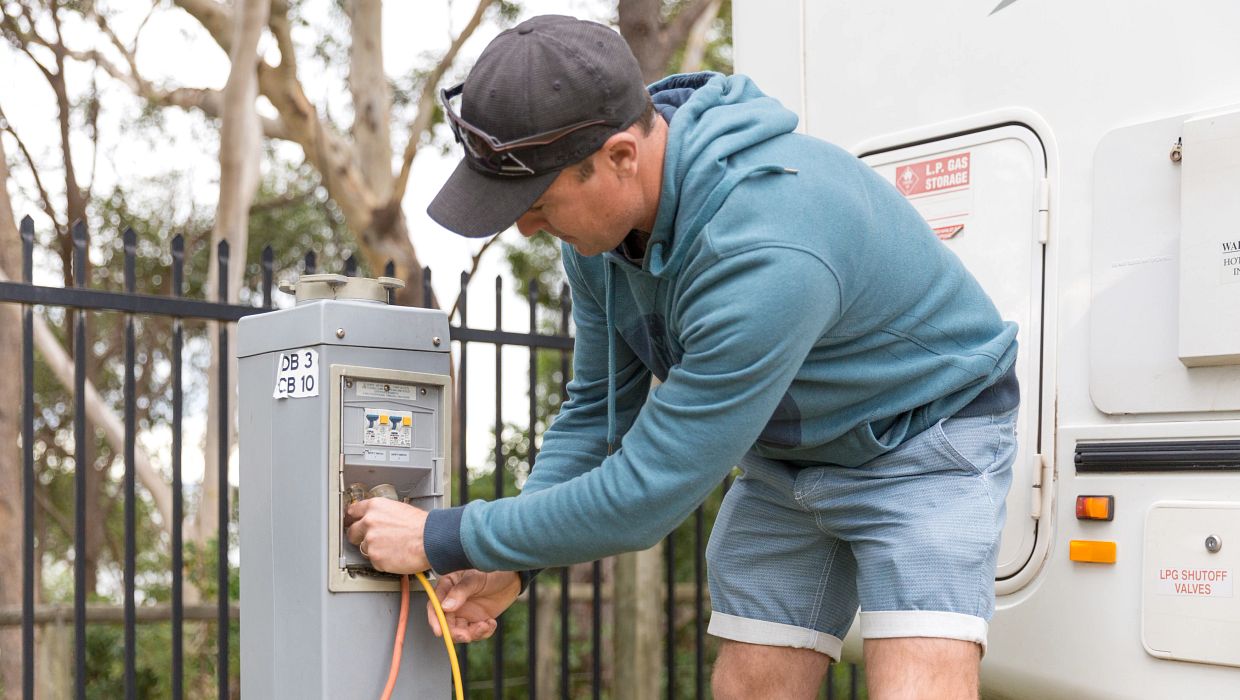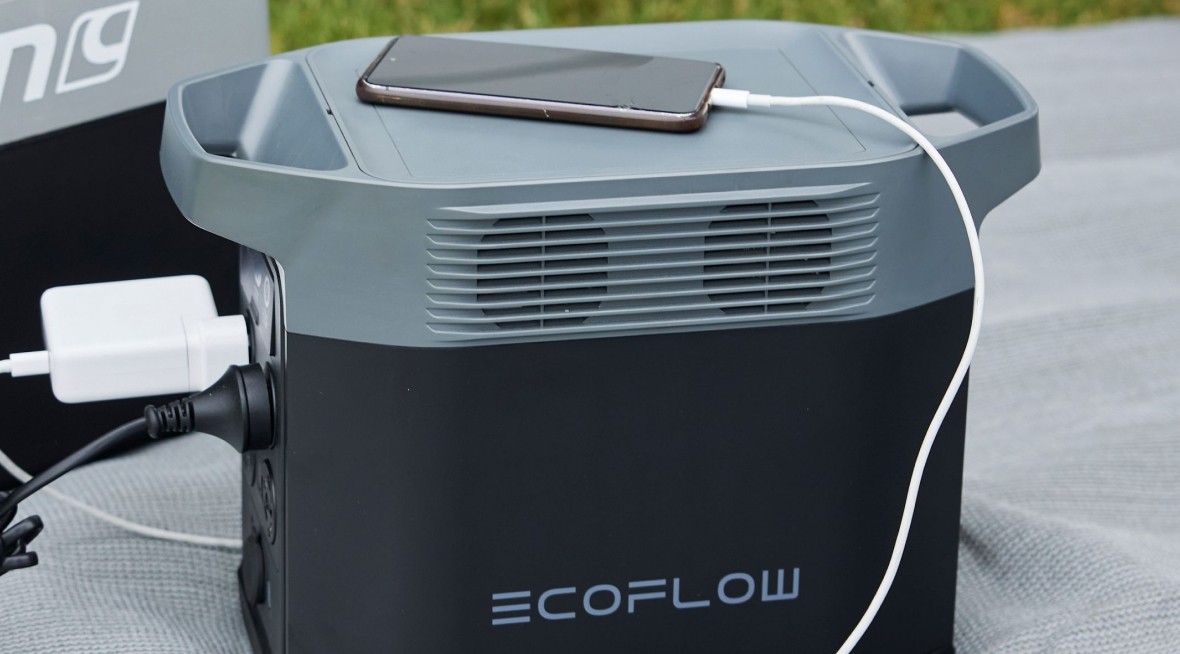How to Power your Motorhome
Author: Your RV Good Guide Date Posted: 11 January 2024

Wondering about which type of motorhome battery is best, whether you need an RV generator, or how to get started with RV solar?
From a hot coffee in the morning to switching on the lights at night, having reliable RV power makes all the difference to your holiday.
In this handy guide, we share the basics of what you need to know to take charge and get powered up.
Powering up with your RV battery
Let's start by exploring the heart of your RV's power system – the 12V house battery.
What is a 12V house battery?
A 12V house battery, distinct from your engine battery, is designed for the unique demands of an RV. Unlike the chassis battery that starts your engine, the house battery powers the living area of your motorhome, including appliances and lighting. It's a deep cycle battery, capable of providing a steady and prolonged power supply, essential for the comfort and functionality of your motorhome.
Different types of house battery
Selecting the right type of RV battery is crucial for optimal performance and longevity. Each type has its unique characteristics and benefits.
Lithium-ion batteries
Lithium-ion RV battery options are increasingly popular in the RV world. They are lightweight and can have a longer lifespan and greater capacity for their size compared to lead acid and AGM batteries. Lithium-ion batteries can discharge more deeply without damage, making them more efficient. Many also come with a battery management system (BMS) for additional safety and longevity.
READ MORE: Everything you need to know about lithium-ion batteries
Flooded lead acid batteries
This type of RV battery is a common choice for RVs due to their affordability and availability. They work through a chemical reaction between sulphuric acid and lead plates inside the battery. While cost-effective, lead acid batteries require regular maintenance, including water top-ups, and need to be stored in ventilated areas due to gas emissions during charging.
AGM (Absorbed Glass Mat) batteries
AGM batteries are a type of lead acid battery but are more advanced. They are sealed, spill-proof, and require less maintenance. AGM batteries are known for their durability and ability to hold a charge for a longer time. They are ideal for RV use due to their reliability and ease of use.
READ MORE: Types of RV batteries explained
How to charge your house battery
Charging your RV's 12V house battery efficiently involves several key considerations to ensure its longevity and optimal performance.
It's important to:
- Safety first: Ensure the charging area is well-ventilated and away from flammable materials, and always disconnect the charger safely once the battery is fully charged.
- Understand your battery type: Different batteries, such as flooded, AGM, gel, or lithium-ion, have unique charging requirements.
- Use the appropriate charger: Select a charger compatible with your specific battery type to ensure safe and effective charging.
- Monitor the charging process: Keep an eye on the charging to prevent overcharging, which can shorten the battery's lifespan.
For a detailed guide on charging your 12V battery, including step-by-step instructions and safety tips, check out our Ultimate Guide to Charging Your 12V Battery.
When to replace your battery
Knowing when to replace your RV battery is key to maintaining uninterrupted power. Consider replacing your battery if you notice:
- Slow charging or rapid discharging
- Visible corrosion or damage
- Unusual smells indicating battery damage
- The battery light on your RV dashboard is on
- Difficulty in starting your motorhome
Regular maintenance and servicing at your local RV Super Centre can help extend the life of your battery and ensure timely replacement when needed.
READ MORE: Tips to extend the life of your RV battery
Powering your RV with mains power
Mains RV power, sometimes known as shore power, acts as a lifeline when you're parked at a campground. It's the go-to source for powering your RV's larger appliances and recharging your RV battery, ensuring you have all the comforts of home while on the road.
How mains power works in your RV
Mains power in an RV works similarly to electricity in a house. When you connect your RV to a campground's power supply, it bypasses the RV's battery system. This direct power source is ideal for high-energy appliances and can also recharge your motorhome battery. It's essential to use the right connectors and cords to ensure a safe and efficient power transfer.
Step-by-step guide to connecting at a campground

- Find a compatible RV power source: Ensure the campground's power supply matches your RV's requirements. Most New Zealand campgrounds offer standard 240V power.
- Use a high-quality RV power cord: A durable and reliable RV power cord is crucial for safety and efficiency. Consider the Campsafe Caravan Supply Adaptor, available in various lengths to suit your needs.
- Connect your RV to the power source: Checking that the mains power source is turned off first, plug one end of your RV power cord into the campground's power supply and the other into your RV's power inlet.
- Switch to mains power: Once connected, turn on the mains power and switch your RV's power source from battery to mains. This will direct the campground's power to your RV's appliances and outlets.
MORE INFO: Watch our helpful ‘how to’ video on using 240-volt power in your motorhome.
Powering up with RV solar panels
Harnessing solar power for your motorhome is not just an eco-friendly choice; it's a smart way to ensure energy independence on your travels. Solar power converts sunlight into electricity, providing a renewable energy source that's perfect for the on-the-go lifestyle of motorhome travel. It's a sustainable way to keep your batteries charged, especially when you're off the grid, giving you the freedom to explore without the worry of running out of power.
How to set up your RV with solar power
Equipping your motorhome with a basic solar setup is straightforward and a great investment in your travel comfort. Here’s what you need to get started:
- RV solar panels: The heart of your solar setup, RV solar panels capture sunlight and convert it into electricity. The type and size of the panel you choose should match your energy needs. For a balance of efficiency and portability, the EcoFlow Portable Solar Panel 110W is an excellent choice. Its foldable design makes it easy to store and the solar panel case doubles as a stand.
- Solar controllers: Solar charge controllers play a crucial role in any solar power system, including those used in motorhomes. Their primary function is to regulate the flow of electricity from the RV solar panels to the battery system. Solar panels can produce more voltage than the battery can safely handle. A solar controller regulates this voltage to a level that is safe for the battery, preventing overcharging. The Camec PWM Solar Controller 12V/15A is a good option for managing your solar power. It helps ensure that your RV solar panels charge your batteries optimally, maintaining the health and longevity of your motorhome's power system.
- Battery storage: To store solar energy for later use, a robust RV battery system is essential. The Camec Sealed Lead Acid Battery 12V/120AH offers ample storage capacity and is designed to handle the cyclic nature of solar charging. RV inverter: An inverter is a valuable addition to your solar setup, especially if you have appliances that run on AC power.
- RV inverters convert the DC electricity stored in your RV batteries into AC power, which is used by most household appliances. This means you can use items like laptops, kitchen appliances, and other electronics that require AC power. The Dometic SinePower Inverter is a great option, especially for sensitive appliances such as espresso machines and microwave ovens.
- Installation accessories: Proper installation is key to maximising the efficiency of your solar panels. The Camec Solar Panel Mounting Kit 40mm provides a secure base for your panels, while the Leader Solar Cable Extension with MC4 Connector ensures a safe and reliable connection to your solar setup.
Powering your RV with a generator
Generators are a popular choice for RV travellers seeking a reliable power source, especially in remote areas where hookups are unavailable. A camper generator works by converting mechanical energy into electrical power. This provides electricity to run appliances and charge your RV's batteries.
Pros and cons of using a generator
Like all power systems, generators come with their own pros and cons.
Pros of using a generator
- Reliability: Generators offer a dependable power source, essential for off-grid camping.
- Power capacity: They can handle high-power demands, making them suitable for running multiple appliances.
- Flexibility: Generators allow you to camp without relying on external power sources, offering greater freedom in choosing your camping location.
Cons of using a generator
- Noise: Traditional generators can be noisy, which might be a concern in quiet camping areas.
- Fuel and emissions: Many camper generators require fuel (like petrol or diesel) and produce exhaust fumes, which can be a consideration for environmentally conscious travellers (and other campers!).
- Weight: Generators can add significant weight to your RV, which may be a factor in terms of your payload and fuel efficiency.
RV Super Centre offers a range of generators suitable for various needs, from compact models for basic power requirements to more robust units for extensive use, with power outputs ranging from 2000W to 8000W. Known for its quiet operation and lack of exhaust fumes, the EcoFlow brand is particularly popular among RV travellers. In particular, the EcoFlow Smart Generator 1800W is a great choice. The generator features versatile start options, including remote start via an app, and an automatic start-stop function for ease of use. Its compact and lightweight design, combined with safety features like CO alert and auto shutdown, make it a practical and reliable power solution for any RV adventure.

Power up your motorhome with RV Super Centre
Exploring the great outdoors in your motorhome is seamless when you have the right RV power solutions. Whether it's solar panels, a reliable generator, or an efficient 12V motorhome battery, there’s an option to suit every type of RV and every type of traveller.
RV Super Centre is your one-stop shop for all your motorhome power needs. Get expert advice and explore our products online or visit your local RV Super Centre.







